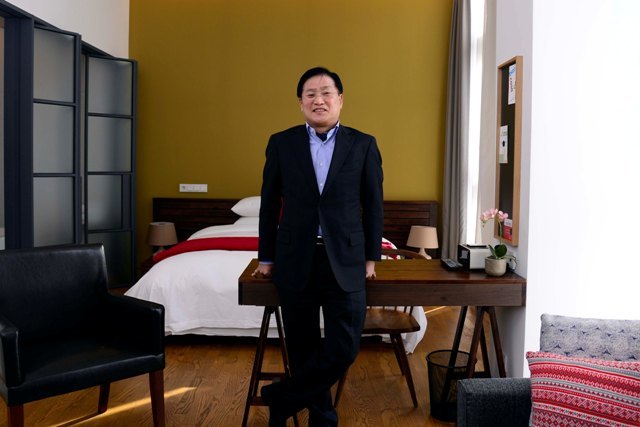
토탈 인테리어 회사 까사미아와 부티크 호텔인 호텔 라까사를 운영하는 이현구 회장은 코리아헤럴드와의 인터뷰에서 "내년 봄까지 호텔 라까사를 증축할 예정"이라고 밝혔다.
현재 한남대교 남단 강남구 신사동에 위치한 호텔 라까사는, 바로 옆 까사미아 본사의 5층부터 9층까지 5개층에 30여개 객실을 더 지어 확장할 예정이다.
"현재 설계 중이고, 두 건물을 구름다리로 연결시킬 계획이다. 빌딩이 둥그런 디자인이라 객실도 좀 더 fun한 룩을 선보일 수 있을 것 같다"고 이 회장은 말했다.
이 회장이 2008년 뉴삼화관광호텔 건물과 부지를 매입했을 때만 해도 그 목적은 까사미아의 매장과 사무실로 쓰기 위해서였다.
하지만 평소 아르마니 호텔, 펜디 호텔 등 해외 디자인호텔들을 눈여겨 봤던 이 회장은, 호텔 허가를 받은 건물이란 점을 이용해 낡은 건물을 감각적인 디자인 호텔로 새롭게 변신시켰다.
2011년 4월 오픈한 호텔 라까사는 고객의 60 퍼센트 이상이 외국인이며 그 중 유럽인이 가장 많고 그 다음은 일본, 중국, 미국 순이다.
단체관광객은 받지 않으며 객실료는 평균 167,000원 선이다.
한편 까사미아는 작년 매출 천2백억원, 지난 25년간 꾸준히 10 퍼센트 이상의 영업이익률을 달성해 왔는데, 그 비결로 이 회장은 "현금 흐름을 중시하는 보수적인 재무경영"과 "과다재고, 과다원가, 고원가, 이중업무, 과다불량(하자)제품 등 5가지의 낭비요소를 없앤 저비용, 고효율 구조로 가기 위한 노력"을 꼽았다.
OEM 생산을 하는 까사미아는 중국에서 제조한지 10년이 되었다. 중국에서 유통하기 위해 만들었던 현지법인은 중국내 유통은 중지했고 현재는 제조와 소싱, 품질관리 기능만 하고 있다.
이 회장은, "5년 전에 비해 중국 인건비가 5배 올랐고 각종 보험 의무 및 위생상태 등에 대한 규정이 까다로워지는 등 사회간접비용이 높아졌으나 여전히 한국보다는 인건비가 싸고 기술도 더 뛰어나 비싼 제품은 중국에서 만들어야 한다"며 한국에서는 가구업종을 기피하는 경향 때문에 가구 장인의 후계자 양성이 잘 안된다고 덧붙였다.
현재 주로 기업고객을 대상으로 하고 있는 스토리지 사업은 단가가 더 높은 개인고객 대상으로 그 비중을 점차 높여갈 계획이다.
까사미아는 5천여개의 가구디자인을 보유한 디자인연구소 외에도 타사보다 높은 직영점의 비율, 그리고 많은 직영점을 효율적으로 관리 가능케 한 업계 최초의 첨단 물류시스템이 대표적인 자랑거리이다.
(코리아헤럴드 김소현 기자)
<관련 영문 기사>
Boutique hotel flies high on Casamia brand
(Hotel La Casa to expand by next spring, creates synergy with furniture business)
HERALD INTERVIEW
By Kim So-hyun
Having charmed guests and hotel industry insiders including those from a five-star hotel in Hong Kong with its stylish yet comforting furnishings, Hotel La Casa is ready to expand.
“We plan to build about 30 more rooms in the building next to La Casa by spring next year,” Lee Hyun-koo, chairman of Casamia which runs the boutique hotel, said in an interview with The Korea Herald.
La Casa is located at the southern foot of Seoul’s Hannam Bridge, next to the offices of Casamia.
These offices, which are housed in the building La Casa will expand to, are to be turned into hotel rooms. “The two buildings will be connected by an overpass,” explained Lee. “The round shape of the building, I believe, could add to the fun.”
The chief executive of Korea’s most solid home furnishing company is bullish about the boutique hotel business, although it wasn’t his initial plan to remodel a beat-up hotel with fine art and Casamia furniture.
Having been intrigued by design hotels abroad like those run by fashion houses Armani and Fendi, Lee decided to make use of the old building’s hotel license.
“When I first bought Samhwa Hotel in 2008, the plan was to use it for showrooms and office space, but later changed my mind to turn it into a boutique hotel furnished with Casamia products,” said Lee who has led Casamia through profitable years since 1988.
“The idea was to create a stylish and comforting space that feels ‘better than home.’ The rooms with different design concepts have different furniture, and unlike other hotels, our furniture is mended year-round and replaced every two to three years.”
Since its opening in April 2011, La Casa has lured thousands of guests, over 60 percent foreign and mostly European, to 61 rooms of 16 different styles including two penthouses.
Birch and maple trees lined up in the small garden towards the hotel’s entrance create a uniquely accommodating and nature-friendly ambience that is rare for urban boutique hotels.
The hotel, based on an daily rate of around 167,000 won, started making profit four months after it opened thanks to the weak domestic currency and increasing inbound tourists.
“Many of our guests become repeat customers,” Lee said. “Some are Chinese tourists visiting Seoul to get plastic surgery in the nearby Apgujeong.”
The fact that La Casa is just footsteps away from Garosu-gil, a street full of trendy shops, cafes and restaurants, has attracted a lot of young people to the hotel.
With the government supporting new hotels in Seoul to meet the surging demand from foreign tourists, Lee expects the number of midsized hotels to keep growing until 2017.
“The current number of hotel rooms in Seoul -- about 29,000 -- hasn’t changed much since 10 years ago. But once all the currently planned hotels spring up, the number will hit 46,000,” Lee said. “This is why hotels must build on their brands in order to survive. In this respect, I believe La Casa has benefited from Casamia’s brand power.”
Lee’s efforts to cut excessive inventories, production costs, expenses, redundant work and defective products, combined with his “very conservative financial management that emphasizes cash flow,” has allowed Casamia to post an operating profit of no less than 10 percent of its sales for 25 years in a row.
The company’s sales hit 120 billion won last year and 60 percent of its customers come back to buy more of its products.
(sophie@heraldcorp.com)








![[KH Explains] How should Korea adjust its trade defenses against Chinese EVs?](http://res.heraldm.com/phpwas/restmb_idxmake.php?idx=644&simg=/content/image/2024/04/15/20240415050562_0.jpg&u=20240415144419)










![[Today’s K-pop] Stray Kids to return soon: report](http://res.heraldm.com/phpwas/restmb_idxmake.php?idx=642&simg=/content/image/2024/04/16/20240416050713_0.jpg&u=)